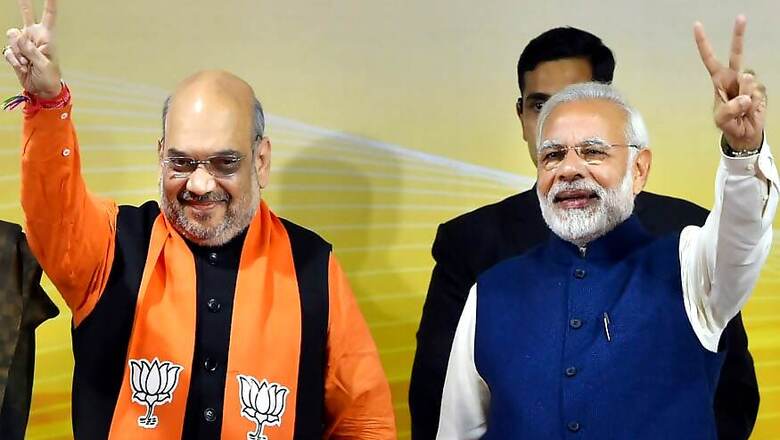
views
India continues to suffer from its original sin: a socialist worldview bolted into its foundation by Jawaharlal Nehru, and on which Indira Gandhi built a ruthless ‘administrative state’. This creation was not dissimilar to that of other post-colonial states, where political demagogues used an authoritarian legacy framework of governance to seize control of the nation’s economy, and then use it to create a network of patronage to perpetuate political dominance. Prime Minister Narendra Modi is the first leader in contemporary history who not only instinctively understands the damage this has done to India, but who is also willing to spend enormous political capital to battle it. Now that India has entered election season, Modi must go to polls seeking the moral mandate to permanently dismantle Congress’ ‘administrative state’.
First, what is the ‘administrative state’? The administrative state is my nomenclature for the rough beast that was born out of Indira Gandhi’s paranoia, and who twisted Nehru’s limited socialist experiments to suit her political ends. Mrs Gandhi nationalised the banks, accelerated the creation of vast state-owned enterprises, and licensed private industry into a state of serfdom.
Once state ownership of the economy had been established, she used discretionary regulatory regimes to centralise economic and political power in her office, and perfected the abuse of the tax and police functions of the state to extract obedience from political and economic actors in India.
The resultant amorphous entity is the ‘administrative state’. It functions as an invisible state-within-a-state. Its weapon is obfuscation and delay; its strategy is one of attrition. Its army is comprised of both, an ocean of mediocre politicians across all parties whose political and economic vocabulary was learnt during the locust years of Indira Gandhi, and second, the enabling framework of sprawling state —institutions and arrogant bureaucrats, both of whom have their hand in the proverbial till.
Some tills dispense money, others dispense power. Petty power is its own currency, petty tyranny its own reward.
Modi is the rare Indian politician who understands this affliction, and who has taken steps to dismantle Congress’ administrative state. Without ceremony or declaration, he has commenced deep reforms in the bureaucracy and increased efficiencies of government programmes to eliminate leakages as a first step.
While he’s yet to meaningfully deliver on a key 2014 promise — that the government has no role in business - Modi and his team continue to expand the breathing space for the private sector through their scandal-free and efficient governance of the economy. But three-and-a-half years after 2014, the process needs to be imbued with a fresh urgency: With a tepid Gujarat victory and a resurgent Rahul Gandhi, the stakes in 2019 have now risen.
At stake are not only the structural reforms that Modi and Arun Jaitley have started, and not even the otherwise important issues of corruption and dynasty around which the 2014 campaign was fought. At stake is the existential issue of straightening the moral arc of India and – I hope one can say this without drama or excess – freeing the long-suffering soul of the average Indian, corrupted and enfeebled through decades of forced participation in the administrative state.
Modi understands, as few other Indian politicians, that economics is not a science, but a moral philosophy requiring of each citizen a framework around which they make old-fashioned individual choices around incentives, rewards and punishments. He is also deeply aware of how the administrative state twisted the decision-making framework of ordinary Indians, and of how, in participating/fighting this ‘system’, it has diminished the moral framework of all Indians. Everything it touches, it soils.
Modi is alone amongst contemporary Indian leaders who can do both: frame a battle in ideological terms, and then have the stomach and the administrative ability to see a fight through. And even though Modi and Jaitley have remained silent on the practical steps required to permanently dismantle this administrative state i.e., privatisation of the government owned banks, sale of the PSUs, and removing the government from being a significant player in the economy, they have begun to take incremental steps to introduce such ideas to the Indian electorate. (The public-market capitalization of PSU banks, the sale of loss-making PSU’s etc. may seem like baby-steps, but one suspects and hopes that these are the trial balloons for the next stage of big-bold reforms post-2019.)
For India to be firmly placed on a multi-decade, double-digit GDP growth trajectory, Modi must now describe this battle in moral and civilisational terms to get the electoral mandate for such deep reforms.
Gujarat has shown that the Congress will be unburdened with discussions about free-markets or the role of government in the country’s economy. Gujarat showed Congress’ willingness to mobilise group identity as a core electoral strategy, and this then could be a harbinger of Congress’ strategy in 2019.
Were Congress to ever find itself in power again, it is quite likely the party would quickly revert to its mean: the ideology-free power-grab of state institutions as has been the history of every Nehru-Gandhi administration. But this would not be surprising: the governance instinct of every other political party in India, and especially of the Congress, is a fruit of the poisonous tree laid by Indira Gandhi.
In the various state elections in 2018, and then especially in 2019, Modi must speak lucidly and without anger of the risks to the still nascent structural reform process, and of how, notwithstanding his youth and apparent sincerity, Rahul Gandhi is the most unlikely of revolutionaries to tear down Indira Gandhi’s temple; his political education and instinct is from the family of which he is off-course the heir, and which remains the patron saint of this rough beast. At its core, the story of India’s reforms since the 1990’s has been that of dismantling the house that Indira Gandhi built.
This then will be the reality of the 2019 campaign. In tenor, it will be increasingly vicious and personal, and now that Rahul Gandhi is beginning to find his voice and his stride (something that is to be cherished for the sake of Indian Democracy), neither side will back down from a brutal contest. As for content, while the Congress is increasingly likely to mobilise social identities and make populist promises, Modi’s core pitch leading up to the 2019 elections must be made boldly and without apology: that this is a high-stakes battle for our souls, and only by dismantling the vicious grip of the administrative state on the economy can India be placed on a robust trajectory of double digit growth. And only then will Indians be truly free.
In the outcome of this battle lies not merely the future of the Indian economy, but of our national character.
Annat Jain is the founder of Acropolis Capital Group, a private equity firm that invests in India. The writer can be reached at [email protected]




















Comments
0 comment